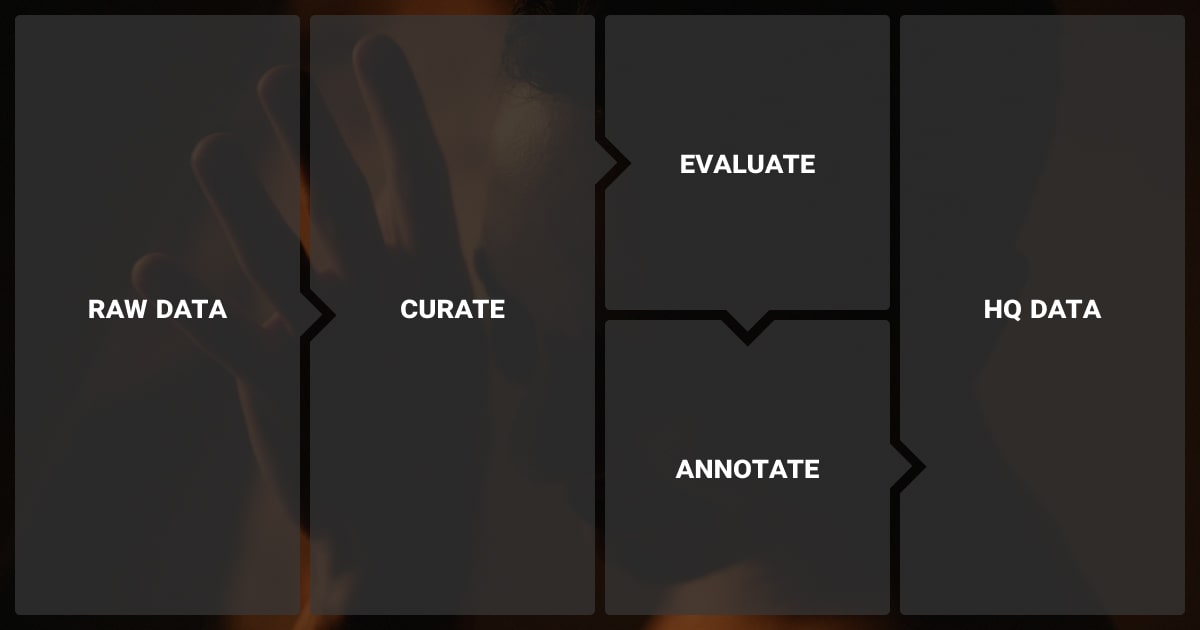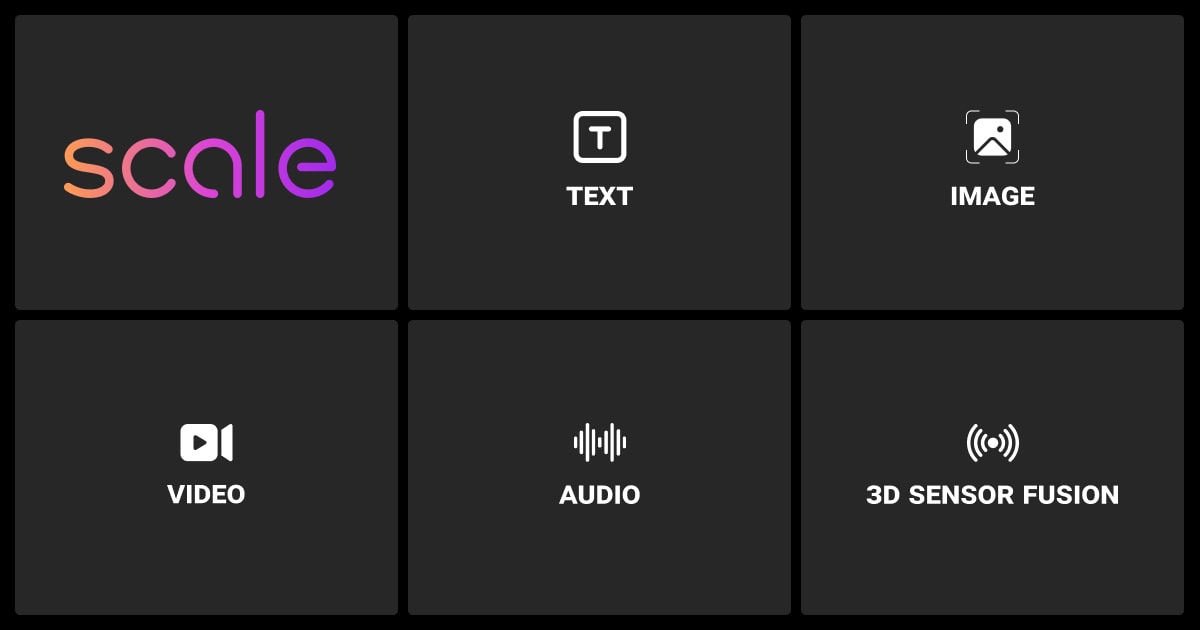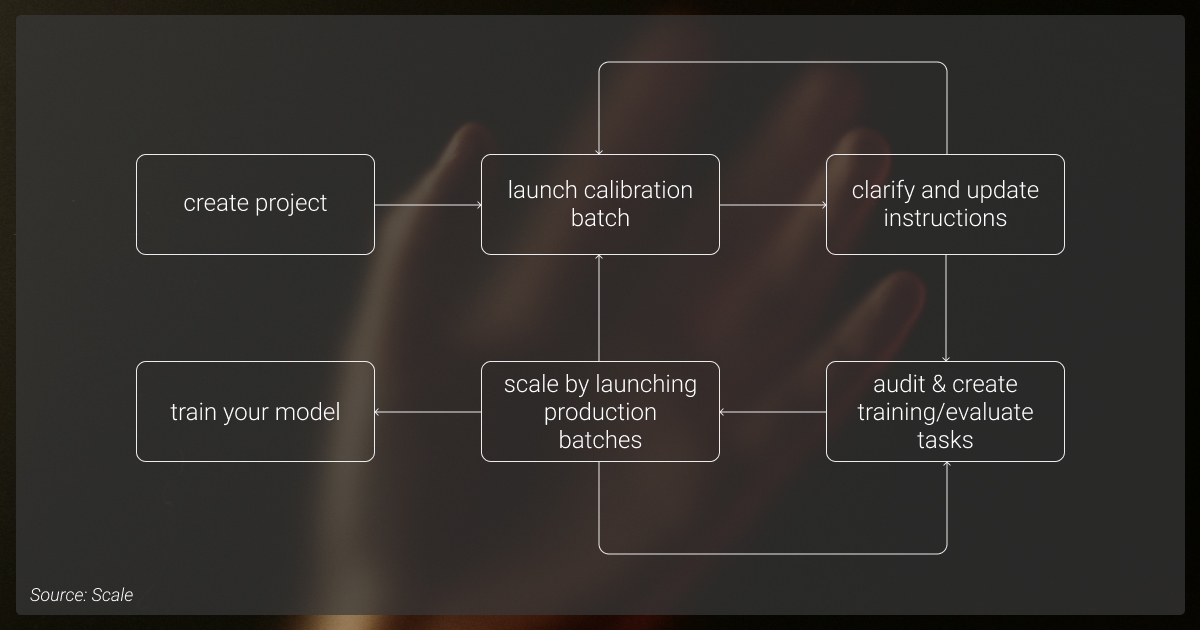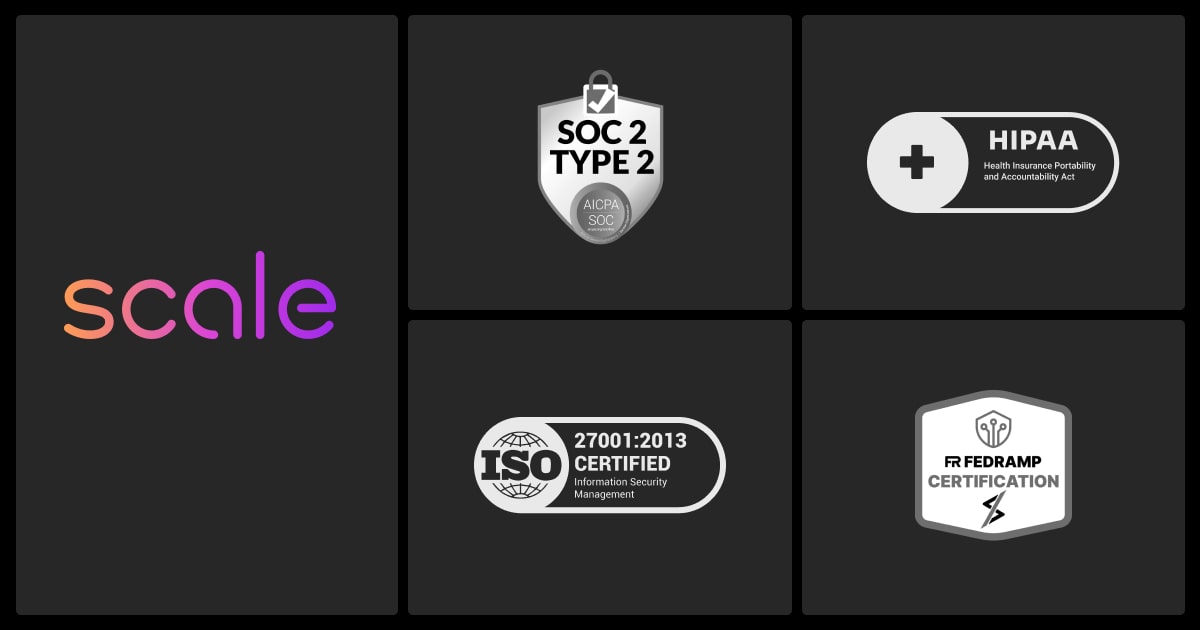Scale AI Review (2025): Features, Pricing, and Top Alternatives
Table of Contents
- TL;DR
- Scale AI Review: How to Choose a Dataset Labeling Vendor?
- Scale AI Overview
- Scale AI Services & Products
- Scale AI Dataset Types
- Scale AI Data Annotation Tools
- Scale AI Integrations
- Scale AI Annotation Process
- Scale AI Quality Assurance (QA)
- Scale AI Pricing: What You Should Know
- Scale AI Pros and Cons
- Scale AI Security and Data Compliance
- Top Alternatives to Scale AI in 2025
- About Label Your Data
- FAQ

TL;DR
- Scale AI offers data labeling, RLHF, model evaluation, and GenAI tooling.
- Its services are built for enterprise AI teams and government use cases.
- Pricing isn’t public; costs vary by task type, volume, and platform (Rapid vs. Studio).
- Pros: wide modality coverage, strong integrations, GenAI support.
- Cons: opaque pricing, variable quality, crowdsourced annotators.
- Top Scale AI alternatives include Label Your Data, SuperAnnotate, Labelbox, and Kili Technology.
Scale AI Review: How to Choose a Dataset Labeling Vendor?
Data annotation is a critical step in preparing any machine learning project. You can either task your engineers with it or outsource to a specialized provider to save time and resources.
In this Scale AI review, we answer a key question: what does Scale AI do, and is it the right fit for your labeling needs? Choosing a data labeling vendor comes down to evaluating how they work and what results they deliver.
Here’s how we assess the vendor:
- Services and products
- Dataset types
- Data annotation tools
- Integrations
- Annotation process
- Quality assurance
- Pricing models
- Security and data compliance
Let's take a look at each one in detail.
Scale AI Overview
Scale AI was founded in 2016 by Alexandr Wang, current owner and CEO, and Lucy Guo, who left the company in 2018. Headquartered in San Francisco, California, the company provides various types of data annotation services in different sectors. They consider their mission to accelerate the development of AI applications.
The company started as a startup, and in these 8 years, it has increased its staff to over 850 people and has already gathered investments from Accel, Founders Fund, Dragoneer Investment Group, and others. With their Remotasks crowdsourcing platform, they hire thousands of annotators from Africa and Southeast Asia to provide annotations for various projects.In their portfolio, Scale AI has already projects for such clients as OpenAI, Meta, Nvidia, Airbnb and many more. Scale AI company review also shows that they have use cases with the governmental and defense authorities.
Scale AI Services & Products

Scale AI manages unstructured data, transforming it into high-quality datasets ready for the training of AI models. The company implements the combination of machine learning and human input approach to provide their services. They believe that with a human-in-the-loop approach, the annotation is more accurate and relevant.
Scale AI Services
Their main services consist of the following:
Data annotation
To improve the performance of ML models, Scale AI provides annotation of images, videos, texts, maps, 3D images.
Data curation
As part of their data management, curation involves testing, evaluating models, and comparing model tools to provide label on only important objects and areas for model training.
Reinforcement learning from human feedback (RLHF)
The AI matter experts assess the model prompts and mark their outputs, evaluating their performance against the defined benchmark (e.g., whether the model's answer is helpful).
Model evaluation
As part of their test and evaluation, Scale AI uses a red teaming approach to identify the model's risks and vulnerabilities. They use both LLM techniques and human insights for assessment.
Generative AI datasets creation
The experts create high-quality datasets customized per your model and project. They generate the needed data for further AI model training.
Scale AI Products
Scale Data Engine
Even though Scale AI positions it as a product, Data Engine is actually a process aimed at improving the performance of machine learning models. It includes the end-to-end preparation of a model, including data collection, curation, annotation, reinforcement learning through human feedback (RLHF), and model evaluation.
Scale GenAI Platform
This platform allows creating your own large language model based on your data and without need to send it to a third party. As per Scale AI reviews, you can use both closed and open foundational models. Besides, the platform already has all the needed integrations, which facilitates your deployment. In a nutshell, this platform provides infrastructure to train, host, and evaluate a Gen AI model of any difficulty and size.
Scale Donovan
This product mostly targets national security and governmental authorities. With the application of a LLM, Donovan helps with extraction and processing of tons of existing data. It accesses your data through cloud or API, applies fine-tuned LLMs for the specific industry, provides relevant outputs, improves, and generates necessary reports. Donovan helps to segment and organize huge datasets for further ML processing.
Scale AI Dataset Types

Taking a Scale AI overview, you'll notice that the company has gathered a solid number of use cases across various industries. This has become possible due to the varied dataset types they work with:
Text
Scale AI provides annotation for various types of documents and transcriptions. They work with natural language processing models and different content. For the use cases, you will be able to annotate datasets for content classification, text generation, transcription, content collection, named entity recognition.
Image
Their annotation of visual data can process electro-optical imagery, infrared, and transcription images. The annotation is possible with bounding boxes, polygons, key points, ellipses, cuboids, and lines. The supported use cases include object detection and classification, semantic segmentation, entity extraction.
Audio
Scale AI reviews diverse audio datasets for annotation, both from active and passive sonars. They work with entities for the same cases as with the text.
Video
The specialists prepare the models for the natural language processing, annotating full motion videos. The principle and types of data annotation are similar to those for the image.
3D sensor fusion
Providing LiDAR annotation and map labeling, the company offers services to autonomous driving industry, to robotics, augmented and virtual reality (AR/VR).
Scale AI Data Annotation Tools

Data annotation with Scale AI is available in two options: Scale Rapid, where you order annotation with their workforce, and Scale Studio, where you bring your own specialists to work on their platform.
Scale Rapid: Considered as a self-serve platform, Scale Rapid allows you to create your own project. It consists of the following steps:
- You upload your datasets and choose the use case needed for your project.
- You write the detailed instructions for labeling your data.
- You create the calibration batch, also known as the smaller set of instructions, for the Scale AI team.
- The specialists from Scale AI review your instructions and start sending you the first responses on your labeling task.
Scale Studio: This is the labeling platform that works similarly. You follow the same steps with uploading your data and selecting the use cases. The difference is that your team accomplishes the annotation, and the platform gives you the possibility to monitor the progress of your annotation.
Scale AI Integrations
Moving on with Scale AI company overview, here are a few words about their integrations. Whether you use the platform for your own annotation or order one of Scale AI's labeling services, you will need to upload your datasets. The company offers the following options:
Public access
If you need to share data which is publicly hosted, providing a simple URL will be sufficient.
Cloud storage
The Scale platform, where the annotation process and communication take place, has a number of built-in cloud hosting integrations. These are AWS S3, Google Cloud Storage, and Azure Blob Storage.
Scale file upload API
There is also an option to attach the file through Scale's own API for files. It is used only in cases to upload the documents to the platform and not the other way around.
IT Whitelisting
This option is applicable only in cases you don't use cloud storage and your dataset has a static set of IP addresses to be shared.
As soon as your content at Scale AI is labeled and ready, you'll need to use Scale API, Sail SDK, or Python SDK to retrieve it.
Scale AI Annotation Process
Since Scale AI benefits from its own platform for data annotation, the process is quite smooth. For the high-quality results, their annotators ask for the detailed instructions and examples. The end-to-end journey will look the following way.
First, both for individual annotation and annotation provided by the Scale AI team, you need to upload the datasets for labeling. By using their platform, you choose one of the suitable formats (attachment from computer, link, sharing through cloud storage, etc.).
After that, you provide detailed instructions for labeling and set the benchmarks that correspond to the desirable annotation. You also specify the desirable number of reviews needed per task.
The data annotation is done in pipelines. For the standard pipeline, you have only one review attempt. For the consensus pipeline, data annotators have three attempts to decide on the final output. Finally, if you select the collection pipeline (currently in beta), you'll get all the responses from annotators, although not consolidated. Thus, to annotate the content at Scale, reviews on the final stage are indispensable.
Once the annotation is complete, and you receive the final output, you download the datasets from Scale AI (generally through Scale API).
Scale AI Quality Assurance (QA)
Scale AI uses a number of approaches to measure the quality of their annotation. During the entire annotation process, Scale AI reviews the labeled data several times before submitting the final version. Their approach includes:
Review cycle
The annotation is split into two layers. While on the first level the annotators label the data from scratch, the second layer annotators monitor the work, add missing annotations, and correct the errors.
Consensus pipeline
The same task is given to multiple annotators and the consensus is chosen for the final version of annotation.
Quality screen
The annotators are given the quality tests, where they need to achieve 99% of accuracy. Only after the test, the annotators start working on the real task.
Evaluation tasks
They are added in different parts of the queue, aimed at assessing the annotated data against the set benchmarks. They show the overall quality of the task annotation.
Scale AI Pricing: What You Should Know
If you’re wondering, is Scale AI worth it, pricing and workforce quality are the key factors to evaluate.
Now, some quick overview on Scale AI pricing. The company sets different pricing strategies for enterprises and for individual clients, even though it doesn't disclose them publicly. There is a custom pricing for companies, with price ranges depending on the type of data annotation and its volume.
The usage of the self-serve platform has its own model, with a “pay-as-you-go” approach and 1000 labeling units offered for free.
As you work with Scale Rapid, the price is calculated per task and is dependent on the task set up and the response of the annotator. The available options include:
- Fixed costs per task. They are dependent on your task type at the time of task creation on the platform.
- Variable costs per task. They are dependent on the annotator's response task.
Project setting multipliers. They are dependent on the batch configuration and are applicable to both fixed and variable costs.
Scale AI Pros and Cons
Wondering “is Scale AI good”? Here’s a quick breakdown of Scale AI pros and cons to help you evaluate whether it’s the right fit for your data labeling needs:
| Category | Details |
| Pros | - Strong client base (OpenAI, Meta, etc.) - RLHF and GenAI tools included - Wide range of supported data types - Enterprise-ready integrations - Specialized tools like Donovan for government use |
| Cons | - No transparent pricing - Quality may vary due to scale of workforce - Limited visibility into annotator expertise - Crowdsourced workforce can raise concerns - Platform UI less customizable than others |
Scale AI Security and Data Compliance

Finally, our last part of security and compliance will help you create your own Scale AI company overview. The company prioritizes their relationships with customers and takes the necessary security measures. They have showed compliance in the following segments:
- System and Organization Controls (SOC) 2 Type II for service commitments and system requirements, assessed by Certified Public Accountant (CPA) auditors.
- Health Insurance Portability and Accountability Act (HIPAA) for protecting sensitive patient information.
- DoD IL4 Provisional Authorization for having all the security requirements for cloud services.
- ISO 27001 for managing and maintaining security information.
The company is also undergoing the compliance checks for obtaining the FedRAMP certification for security and authorization and monitoring of the federal government products and data.
Top Alternatives to Scale AI in 2025
Looking for Scale AI alternatives for labeling? Below we compare the top platforms and service providers in 2025.
We hope that this comprehensive Scale AI review will help you make a decision on your next data annotation vendor. For an exhaustive view on market possibilities, consider also the following Scale AI alternatives:
Label Your Data
Label Your Data helps to move your ML projects forward, providing high-quality data annotation both for NLP and computer vision use cases. Our extensive experience in the field helps to prepare ML models across industries. We offer a free pilot and put our customers at the heart of our activity, which proves our compliance with the industry standards (CCPA, ISO:27001, GDPR, PCI DSS).
SuperAnnotate
SuperAnnotate provides data annotation, data management, and automation services, preparing your ML models for further deployment. Working with various types of data, from images to texts, to point cloud data, they take on your projects in different fields. Read more about this company in our recent SuperAnnotate company review.
Kili Technology
Kili Technology company offers a number of services for labeling and training machine learning datasets. Besides annotating data for you, they have a self-serve platform. They work with texts, images, videos, OCR, and geospatial annotation. Besides, the company possesses compliance certificates to prove their security measures.
About Label Your Data
If you choose to delegate data annotation, run a free data pilot with Label Your Data. Our outsourcing strategy has helped many companies scale their ML projects. Here’s why:
Check our performance based on a free trial
Pay per labeled object or per annotation hour
Working with every annotation tool, even your custom tools
Work with a data-certified vendor: PCI DSS Level 1, ISO:2700, GDPR, CCPA
FAQ
What is the criticism of Scale AI?
Criticism often centers around opaque pricing, quality inconsistency due to reliance on crowdsourcing, and limited transparency in the annotation pipeline. These are important factors to weigh when outsourcing.
Is Scale AI a Chinese company?
No. Scale AI is a U.S.-based company headquartered in San Francisco. It was founded in 2016 by Alexandr Wang and Lucy Guo.
Will Scale AI ever IPO?
As of now, Scale AI has not announced any official IPO plans. However, its valuation and client portfolio have led to speculation about a future public offering.
Is Scale AI worth it for data labeling?
For enterprise teams with large-scale, multi-modal data needs and internal ML infrastructure, Scale AI can be a strong fit. For smaller teams or projects requiring more hands-on support, other providers may offer better value.
What are the best Scale AI alternatives for labeling?
Top alternatives include Label Your Data (service-first with a free pilot), SuperAnnotate (hybrid with automation tools), Labelbox (platform with model-assisted workflows), and Kili Technology (UI-focused with compliance features).
Written by
Karyna is the CEO of Label Your Data, a company specializing in data labeling solutions for machine learning projects. With a strong background in machine learning, she frequently collaborates with editors to share her expertise through articles, whitepapers, and presentations.

